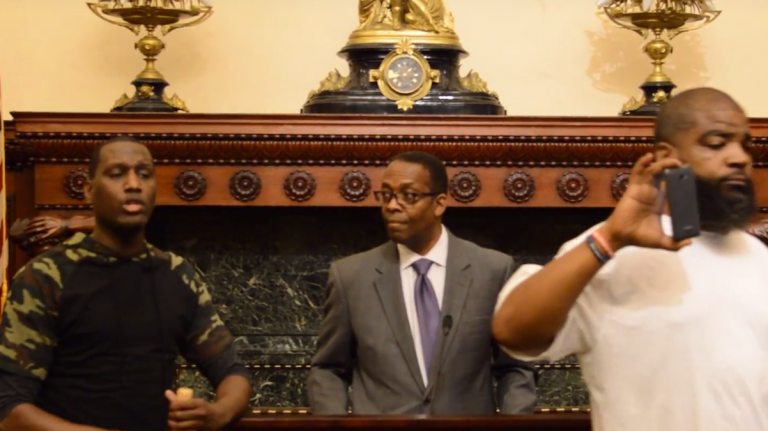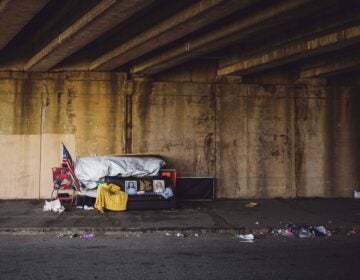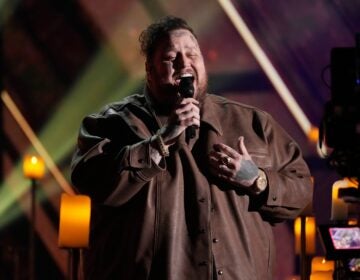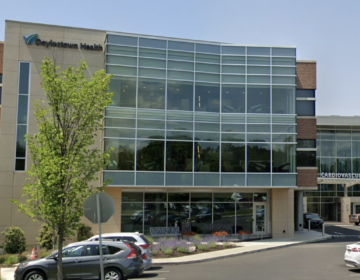After protest at home of Philly cop who killed suspect, union to challenge identifying police in shootings
Listen
Black Lives Matter protesters disrupt a City Council hearing over the death of David Jones. (Kimberly Paynter/WHYY)
Normally, the loudest noise you might hear on Ryan Pownall’s sleepy Northeast Philadelphia block is the occasional roar of a lawnmower.
Last Thursday, the block echoed with bullhorned shouts of “He’s a f**king murderer!” and “If we don’t get no justice, y’all will NOT get no f**king peace!”
The protest — organized by Black Lives Matter against Pownall, a city cop who shot and killed a man in the back during a June traffic stop — lasted just an hour, drew only a handful of demonstrators, and ended without violence or vandalism.
But it exploded a long-simmering war between police reformers and the union that represents the city’s 6,400 officers.
Reformers say the city’s practice of releasing the names of officers in police-involved shootings — first adopted by former police Commissioner Charles Ramsey and continued by current Commissioner Richard Ross — is the first step in transparency and helps ensure accountability.
But the union long has opposed the policy, saying it endangers officers who fear reprisals by activists angry about brutality. The protest outside Pownall’s house, with activists hanging WANTED posters picturing Pownall on telephone poles, “crossed a line,” Fraternal Order of Police president John McNesby said.
So the day after the Thursday night protest, union officials went to court to demand an injunction that would end the policy. They didn’t win entirely — but they did win the right to challenge the release of any names before a full hearing on the matter on Sept. 29 in Common Pleas Court. The city also agreed to wait three days before releasing officers’ names, which they already do.
“You can’t put your law and order people in jeopardy, alright?” McNesby said. “Let the investigation take its course, and let’s see where it leads before you go out there and start releasing people’s names for transparency.”
‘Supreme presumption of innocence’
McNesby couldn’t cite examples of officers endangered by having their names publicized, beyond his objections to the Pownall protest.
One police reformer said that’s because there are none.
“There have been hundreds and hundreds of police-involved shootings over the years,” attorney David Rudovsky said. “There is simply no history in Philadelphia of any officer being intimidated or assaulted or any other kind of criminal action against an officer simply because that officer’s name was released.”
Civil rights attorney Lloyd Long called McNesby’s comments “propaganda.”
Withholding the names of officers who shoot people “tells law enforcement that regardless of how wrong they are, a supreme presumption of innocence is going to apply to them that applies to no one else. That presumption is almost irrebuttable,” Lloyd said. “Somebody who is engaged in a shooting who is not a police officer gets their name released, even if they’re merely a suspect. The police, who in the vast majority of circumstances we can confirm who the shooter is, don’t think the rules apply to them.”
To attorney Paul Hetznecker, the broader issue is accountability.
“When you’re talking about police investigations, the age-old question of who guards the guards becomes highlighted because you have internal affairs officers investigating other police officers,” Hetznecker said. “The real question becomes: Should they be able to conduct these investigations, No. 1, at all? No. 2, in secret? Shouldn’t there be a level of transparency that allows for the kind of accountability that a democracy demands?”
“Police officers are public officers,” he added. “They serve in a public forum. Their conduct is evaluated publicly. If misconduct has been committed, the first step in accountability is releasing the information, including the names of the officers directly involved.”
Long crusade yields legislation to protect identities
The issue has been a years-long crusade for the union, which enlisted state Rep. Martina White, R-Northeast Philadelphia, to introduce a bill that would withhold officers’ names for at least a month after a shooting. Gov. Tom Wolf vetoed the bill, but a similar bill is now pending in the Legislature.
White sprang to police officers’ defense again after the Pownall protest, calling it an “illegal occupation” that Mayor Jim Kenney and Ross should have stopped.
“Black Lives Matter activists invaded a residential neighborhood without a permit, utilized bullhorns to spew profanity, and threatened an endless occupation of that neighborhood until their demands are met,” she said. “This same unlawful protest also required a contingent of police officers who would otherwise be working to preserve safety across our city to instead protect the residents of this neighborhood, including the officer and his family.”
Asa Khalif, a Black Lives Matter organizer who participated in the protest, said the group is not reluctant to picket police officers’ homes again, even though some of Pownall’s neighbors heckled them. A Facebook Live video of the protest has gotten more than 137,000 views.
Protesting outside the homes of controversial cops is not unprecedented.
About a dozen activists rallied last month outside the Lansing, Michigan, home of a white police officer caught on video pinning a black teen to the ground. In Anaheim, California, hundreds of protesters rallied in February outside the home of a Los Angeles police officer, after video surfaced of him firing a gun while scuffling with an unarmed 13-year-old who had walked on his lawn. And, in 1999, protesters held several rallies outside the homes of the New York officers who fatally shot Amadou Diallo, a young, unarmed immigrant they mistook as a rape suspect.
In the case of Philly’s David Jones, activists have marched and interrupted politicians’ news conferences to demand an outside investigation and Pownall’s termination.
Pennsylvania Attorney General Josh Shapiro earlier this month confirmed his office was taking over the investigation into Jones’ death, after the Philadelphia district attorney’s office — citing an unspecified conflict of interest — asked for the review.
In the meantime, the union will host a “Back the Blue” rally at 6 p.m. Thursday outside its headquarters in the Far Northeast to drum up support for law enforcement.
“We’re going to send a message that the community is out there to support the police,” McNesby said. “We need the community, fellow officers, family members — but more importantly, we need politicians — to stand up.
“Get a backbone, and stand with the police, and show that you support them,” he said. “And we’re going to be taking notes. We’re going to see who is there Thursday night, and who is with us and who is not with us. And we’ll remember that down the line if they do not come.”
Khalif said his group also plans further actions, although he declined to divulge details.
Correction: This story has been updated to reflect that the city already does wait three days before identifying officers involved in shootings.
WHYY is your source for fact-based, in-depth journalism and information. As a nonprofit organization, we rely on financial support from readers like you. Please give today.




